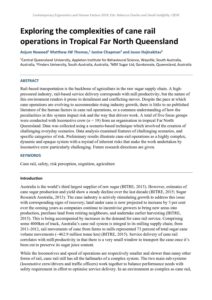| Document | Author Anjum Naweed, Matthew JW Thomas, Janine Chapman and Jason Hajinakitas |
| Abstract Rail-based transportation is the backbone of agriculture in the raw sugar supply chain. A high-pressured industry, rail-based service delivery corresponds with mill productivity, but the nature of this environment renders it prone to derailment and conflicting moves. Despite the pace at which cane operations are evolving to accommodate rising industry growth, there is little to no published literature of the human factors in cane rail operations, or a common understanding of how the peculiarities in this system impact risk and the way that drivers work. A total of five focus groups were conducted with locomotive crew (n = 19) from an organisation in tropical Far North Queensland. Data was collected using a scenario-based technique which involved the creation of challenging everyday scenarios. Data analysis examined features of challenging scenarios, and specific categories of risk. Preliminary results illustrate cane-rail operations as a highly complex, dynamic and opaque system with a myriad of inherent risks that make the work undertaken by locomotive crew particularly challenging. Future research directions are given. |

